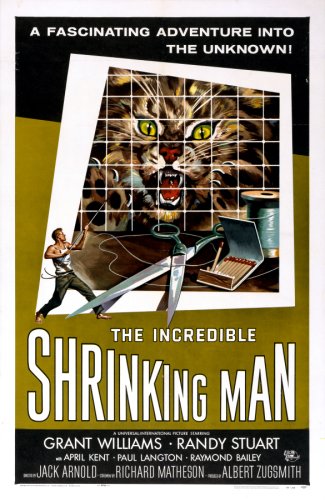

When Scott and Louise are talking with the doctor and she remembers the day they were in the boat and he mentions the mist, Louise's shirt changes to black as they get into the car.
When Scott brings the lampshade to the ground, the lampshade cover falls upside down.
Between shots it appears to be turned on its side.
When Scott approaches the bird behind the wire mesh, he is holding the piece of cake with his left hand.
Next shot the piece of cake is in his right hand.
Look carefully when Scott is running from the cat and from the spider.
In the close-up shots Scott has a shadow.
In the distant shots he has no shadow because he wasn't really there, he was just placed on top of the film! When Scott is crossing the hole in the crate by holding onto a rope and walking on the ledge of the paint can, the extra rope that should be hanging in the hole stays horizontal, revealing that the hole is, in fact, not a hole.
It is especially visible when he gets to the other side and pulls back the rope towards him.
When Scott is standing at the top of the cellar stairs, calling down to his wife, the picture on the wall behind him is clearly visible through his body.
Although Scott Carey grows increasingly smaller, the pitch of his voice never changes.
The pitch of a person's voice is primarily dictated by the size of the vocal chords; as he decreases in size, his voice should have increased in pitch, eventually becoming inaudible to human ears.
As Scott goes out into the night to the diner, people walking around cast shadows on the ground.
Yet, Scott casts no shadow at all.
In all of the far shots of Scott being small, he casts no shadow.
Yet, he does cast a shadow in the close up shots.
Hugo |
| Best Dramatic Presentation |
One of the best of the many weird and wonderful science-fiction movies of the 1950's, this one has stronger credentials than most. Written by future "The Twilight Zone" doyen Richard Mathieson and directed by genre master Jack Arnold, it takes a simple idea and really runs with it.
No sci-fi movie from the 1950s had more thoroughly had me on the edge of my seat than Jack Arnold's 1957 chiller "The Incredible Shrinking Man" (adapted from the novel "The Shrinking Man" by Richard Matheson, also this film's screenwriter). Well, I take that back.
What a fantastic film this is: Richard Matheson's finest feature-length script is like the best of his Twilight Zone episodes, both wonderfully imaginative and thoughtfully philosophical at once.It begins in bland, generic, white picket fenced 1950s America and ends in deep contemplation of the infinite, and along the way becomes unmoored from all reference points from the age in which it was made, as the protagonist himself has every thing familiar to him progressively stripped away and he is reduced to the most raw, primal, archetypal battle for survival.
The antithesis of the Movie The Amazing Colossal Man, this 50's sci-fi tale starts on a boat. A man and his wife enjoying the ocean and each others company until he gets hit with a strange sparkling mist.
Jack Arnold directed this excellent science fiction tale based on a story by Richard Matheson. Grant Williams plays Scott Carey, who is one day vacationing on a boat with his wife Louise when it passes through a strange mist.
I was browsing TV one night and came across this title. Black and white movies from the 50's usually aren't my first choice, but this caught my eye.
Communism my a$$, McCarthyism no way, nuclear warism... not hardly!
With a title like "The Incredible Shrinking Man", this movie was a whole lot better than it had any right to be. Two primary reasons - the special effects are spectacular for the era, and the philosophical underpinnings of Grant Williams' character, Scott Carey.
Based on the 1956 novel "The Shrinking Man" by Richard Matheson who adapted it for the screen, this is an excellent film which skillfully combines science fiction spectacle and well-observed social commentary. In many respects, it is like a feature length episode of "The Twilight Zone", which it predates by two years.